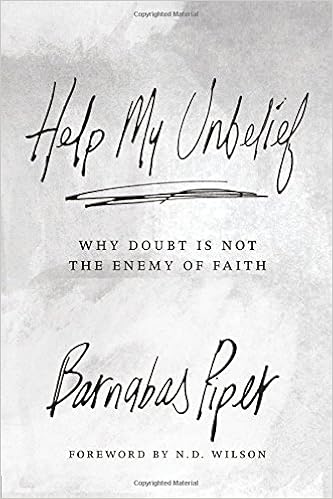 I’m convinced that doubt has become a sexy virtue in our culture. Our generation has rightly understood that the Bible invites us to an authentic expression of doubt. But we’ve wrongly assumed that being in a state of doubt is an attractive virtue or somehow the summit of Christian experience this side of Eden. I have to confess I’m often tempted to keep doubt around a little longer than I should.
I’m convinced that doubt has become a sexy virtue in our culture. Our generation has rightly understood that the Bible invites us to an authentic expression of doubt. But we’ve wrongly assumed that being in a state of doubt is an attractive virtue or somehow the summit of Christian experience this side of Eden. I have to confess I’m often tempted to keep doubt around a little longer than I should.
Given my repulsion at doubt being considered a sexy virtue, I was intrigued by Barnabas Piper’s new book Help My Unbelief. The subtitle is what really grabbed my attention: “Why Doubt Is Not the Enemy of Faith”. Part of me wondered if as I read this I’d be disappointed that Piper had went the way of those who now consider doubt to be a virtue. But the other part of me wondered if this book might help to fill in some gaps in my own mind about the relationship between faith and doubt.
You see part of my repulsion at making doubt a virtue has to do with my own struggles. I go through periods of darkness in my mind and soul. During these times the virtuous doubters are very appealing to me. Hearing the “doubt is okay” mantra can cause me to stop putting up a fight and just be comfortable with muddy belief. I know that a weak faith can lay hold of a strong Christ. This precious balm for my soul, but it can also be an enemy to my growth because I can wrongly assume there is no difference between a weak faith and a strong faith. As a result, rather than crying out “Help my unbelief!” I just sit and wait out the storm.
This is where Piper’s book was exceedingly helpful. His central argument is that there is a type of unbelieving doubt which leads to idolatry and apostasy. But then there is also a good type of doubt—akin to the questioning child—which questions in order to believe. This kind of doubt is not the enemy of faith—in fact its is just the opposite. In fact not wrestling with the tension between belief and unbelief might indicate that we are either infantile Christians or not Christians at all. (28)
There is a type of faith which might outwardly seem to be strong but inwardly it is pretty void. This is the type of faith which Piper confesses to having had, and which I too have struggled with. This paragraph hit me like a ton of bricks:
When all we have is the mental-assent part of belief, though, we base our actions on some other standard: our emotions, our happiness, our stresses. We know there is a higher standard, but only cognitively, not transformationally. What we know about God is not the same thing as believing in Him and having that transforming faith. In fact, it can even be a deterrent because mental assent so easily substitutes for real life change. (49)
The most real type of faith acknowledges our finitude and our limits. It is even honest with the struggle of doubt, after all “we are prone to practice it” (96). But authentic faith will find itself crying out “help my unbelief”. Piper is certainly correct, “the desire to believe can stem only from belief”. And this is why doubt as virtue simply doesn’t work. Jesus responded to this type of doubting faith because it came from a heart which wanted to believe. He didn’t want to stay in his state of unbelief. Doubt isn’t a virtue—but it’s not decisively negative either.
At the end of the day the most important thing is our relationship with Christ. I appreciate how throughout the book, Piper unblushingly points to our union with Christ. In his afterword he says, “what I hope readers take from these pages is a clearer vision of God and the wonderful reality of relationship with Him. There really is hope nowhere else…” (151)
As far as I’m concerned Piper achieved his goal. Reading through this book challenged me and it strengthened my faith. It helped establish an ecosystem in which my faith was able to grow organically. (117) I appreciate so much about this book. It was one of those books where you can feel your mind and your heart lean towards Christ just a little more. This isn’t a how-to book and I’m glad. This is a call to embrace Christ as we wrestle through the tension between belief and doubt.
You can (and should) pick up a copy here.